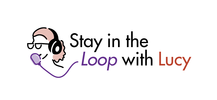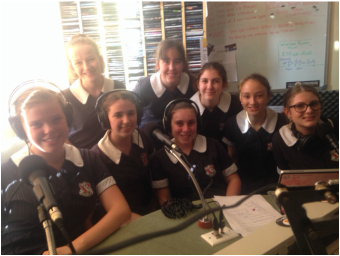Language used about refugees has the potential to dehumanise vulnerable people It is shocking to think that there are children in detention who think that way of living is 'normal'
The Mind Your Language team is taking part in an internationally recognised competition as part of the Future Problem Solving Program at their Mount St Benedict College in West Pennant Hills.
The team members include: Rebecca, Amelia, Anthea, Audrey, Mackenzie, Sarah, Bella and Lucy "The Future Problem Solving Program has given us an opportunity to solve issues within our community, it has given us a voice to say "this is wrong"." The Basis of their Project is to bring awareness to the fact that the words we use around the Refugee situation. The research they have had to do is extra-ordinary and the whole show is well worth listening to to hear what young people think about the way we have handled this whole subject. It is a very humane approach yet they are open to understanding both sides of the debate. They are engaged which was so incredibly refreshing to witness. I felt privileged to host them.
Who is a Refugee?
Someone who has fled their country of origin and is at risk of persecution because of race, religion, political opinion, nationality, or membership of a particular social group. Persecution usually means torture, imprisonment without trial, mistreatment and /or other serious denial of rights
Who is an Asylum Seeker?
Someone who has applied for protection as a refugee and is awaiting determination of their status. All refugees have been asylum seekers either in Australia or in another country, but not all asylum seeker are found to be refugees.
Current and future projects
They were originally inspired by a campaign from Julian Burnside QC to write letter to politicians and refugees - yet they shared how desperate they felt when the letters written directly to the people in detention centres were returned. Many from the Mind Your Language team felt that it took away any hope for the refugees. Refusing to deliver the letters written to them by members of the community isolated them from a community they might one day be moving into.
Human Rights
Learning Human Rights in school makes them all the more dedicated to show that we have to be particularly careful of the words used to describe people who come to us for protection from danger. They are not illegal, they have a right to look for protection and we have a duty to investigate their options. They are not boat people, they are people who have arrived by boat... the words used in the books they are studying from are already written so the students started the conversation with their teachers about ensuring that they way they taught the class was more balanced, fair and discussed the use of language as an influencer of opinion. The Australian Human Rights Commission and its president, Professor Gillian Triggs has come under considerable attach since releasing the report on the Inquiry into Children in Detention. The report had been discussed at length in their school and found to be really insightful, yet the behaviour relating to Professor Gillian Triggs raised a good question for everyone about how, when you see people be vilified for saying something other people do not want to hear, whether it silences the questioning voices. It did not get the impression these young women would accept that just because something is unpopular it should not be said. "The Standard you walk by is the standard you accept" - they were NOT accepting the standard being set, or the language being used on their behalf, therefore they were not 'walking by' but standing actively getting involved. As part of their research they looked at Operation Sovereign Borders and also compared that policy to international policies. They compared Australia to Italy and found flaws. Ultimately there is a very big difference in processing time - 2 weeks to 5 years is a very different amount of time to process and the longer the time in centres the more likelihood of adverse physical and mental health.
On average, more than 90% of asylum seekers who arrive by boat are found to be refugees and around 40% of asylum seekers who arrive by plane are found to be refugees
- Source Go Back to Where You Came From Schools pack We couldn't understand why Australians hated us
A big thank you to Glorious Music for the use of their music throughout this show's podcast - check out their website here. The tunes used are from their Dance Albums
Resources
Definition of Refugee and Asylum seekers from STARTTS.org.au
Australian Human Rights Commission Asylum seekers and Refugees SBS, Go Back to Where You Came From - Schools pack UNHCR - The UN Refugee Agency A link to another project - Strangers on a Bus which may be of interest brought to my attention via The Guardian Comments are closed.
|
Categories
All
AuthorLucy Dahill is the presenter of Stay in the Loop with Lucy, she has a passion for offering people the platform to share their voice. Young, old or somewhere in between we all have wisdom to share if we trust our hearts over our heads. |


 RSS Feed
RSS Feed